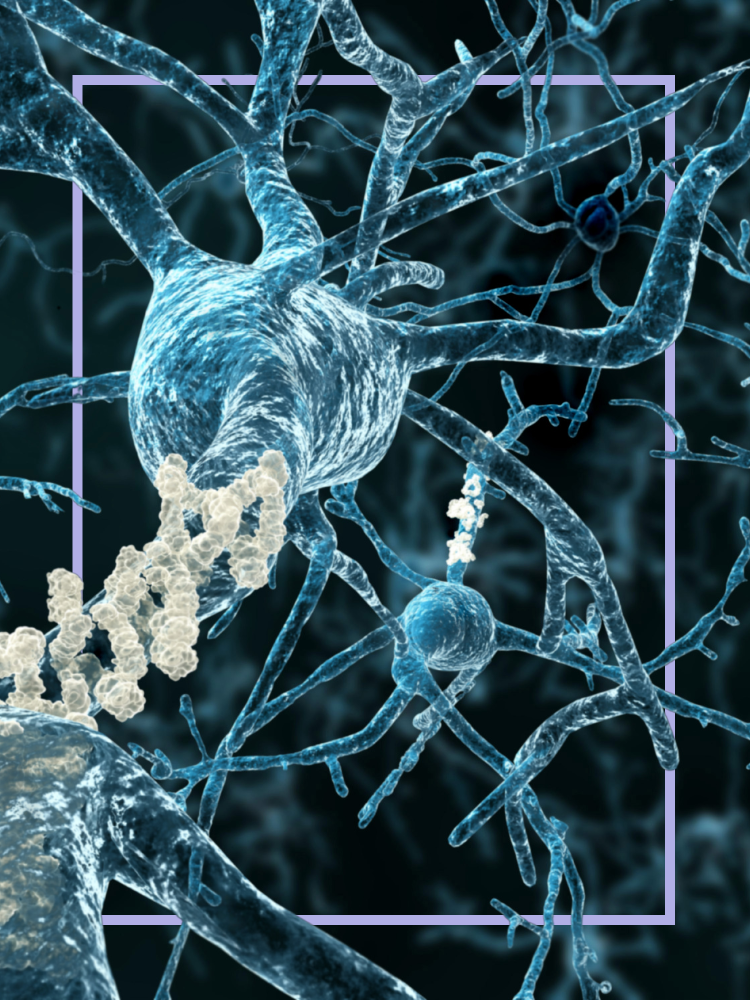Mental health data

As mental health becomes a growing part of the global public health agenda, experts at Oxford are using data to personalise patient treatments and inform global economic policies.
They're improving public health records and assessing the financial implications of mental health, exploring the opportunities of big data and using digital tools to analyse Alzheimer's disease.
Mental health data and public health records
Using UK Biobank data
UK Biobank (UKB) is a large-scale biomedical database and research resource – the largest and richest dataset of its kind.
Accessible to researchers around the world, UK Biobank is led by Professor Sir Rory Collins, Head of Oxford Population Health and British Heart Foundation Professor of Medicine and Epidemiology, with Professor Naomi Allen holding the role of UKB’s Chief Scientist.
Professor Allen, alongside Professor Elaine Fox, Dr Jo Holliday and experts from a number of universities across the UK, investigated the scope for further characterisation of mental health disorders amongst participants in the dataset.
Consulting with a patient group, the researchers designed an online mental health questionnaire in 2017, to which they received 157,366 responses by August of that year.
Built into UK Biobank, the data intersects with other health data to offer crosscutting biomedical research involving mental health. Results from the survey showed that 34% of respondents had received at least one psychiatric diagnosis, with depression being the most commonly reported, followed by ‘anxiety or nerves’.
While UK Biobank is widely employed to investigate mental health disorders, there is still a need to systematically investigate its data’s applicability and relevance in a clinical setting. In order to do so, a group of researchers from the University’s Department of Psychiatry, led by Dr Zhenpeng Li, conducted a validation study with linkage to UKB from the Oxford Clinical Record Interactive Search (CRIS).
The study found that both data sources represent untapped potential for comprehensive research in mental health.
An Oxford University spinout, Cristal Health, was established in May 2019 as a sustainable way to accelerate the UK-CRIS network. The network, which operates a managed service for secure access to one of the world’s largest repositories of de-identified patient data relating to mental health and dementia conditions, consists of a group of NHS Mental Health Trusts from across the country.
‘The spinning out of remarkable new companies like Cristal Health is great news. It brings in investment which allows for exciting initiatives and innovative activity developed in the NHS and Universities to grow more quickly and become sustainable.’
Cristal health will focus on three areas – developing offerings to help in early-stage drug discovery, supporting NHS trusts in generating revenue from increased participation in the global trials market, and supporting academic research.
Any profits from Cristal Health will be re-invested into its core purpose of accelerating improvements in medical research, services and outcomes for patients with a mental illness and/or dementia.
Improving public health records and using public health data
Electronic Public Health Records (EHRs) are an important feature of modern health care systems, helping clinicians plan, document and deliver care for patients. They can advance patient safety and reduce clinical workloads, as well as allow for the exchange of information so that different healthcare providers can provide continuity of care.
Studies have shown that clinicians report usability problems as being the most common barrier in using EHR systems – something that can have implications both for clinicians and for patient wellbeing.
Issues with the EHRs can increase a clinician’s cognitive workload, as well as increase time pressures and psychological distress.
There has been little research conducted on the ease of use of EHRs in mental health, so a team of Oxford experts, including Dr Ruta Buivydaite, Gurpreet Reen, Professor Charles Vincent, and colleagues from the Oxford Health NHS Foundation Trust, set out to improve their usability.
In conducting their study, the researchers aimed to increase the number of completed forms, improve clinician experience and reduce the time spent completing and duplicating patient information.
The initial results from the improvements made to the EHR assessment forms saw a 40.9% reduction in time taken to complete the form – from an average of 62.06 minutes to 36.67. They also reported a 71.4% decrease in time spent duplicating patient information, and an overall increase in satisfaction with the usability of the forms.
As well as improving public health records, Oxford researchers are using public health data to analyse the impact of the COVID-19 pandemic on mental health.
Researchers from the Nuffield Department of Primary Care Health Sciences investigated changes in weekly counts of mental health consultations and prescriptions, highlight how a reduction in the number of mental health consultations during the pandemic need to be considered when planning future services and quality improvements to reduce the negative effect on public health and healthcare.

Oxford's Big Data Institute
Oxford's Big Data Institute
Data platforms represent a new paradigm for carrying out health research, but there are of course ethical factors to take into consideration when using, or sharing, an individual’s data.
Colleagues from the Wellcome Centre for Ethics and Humanities, the Centre for Health, Law and Emerging Technologies (HeLEX) and the Department of Psychiatry have explored some of the ethical issues in consent for the reuse of data in health data platforms.
Another collaboration between the Wellcome Centre for Ethics and Humanities, based at the University's Big Data Institute, and the Department of Psychiatry, alongside a number of other UK universities and institutions in Bulgaria and Slovenia, looks at an adolescent perspective of data sharing.
Phenotype:
The set of characteristics of a living thing, resulting from its combination of genes and the effect of its environment
The researchers highlight how advancements in genetics and digital phenotyping in psychiatry have given rise to testing services that claim to predict psychiatric outcomes before difficulties emerge.
Their study aimed to investigate the adolescents’ interest in predictive testing for mental health issues, and their attitudes towards sharing biological, psychosocial, and digital data.



Using data to inform care and treatment

Using health data to inform care and treatment
People are living longer, with more long-term physical and mental conditions which worsen their health – for example high blood pressure, which is associated with risk of heart attack and stroke.
Researchers from the Nuffield Department of Primary Care Health Sciences use information from large databases of electronic health records to better target preventative treatments to patients.
The Stratified Treatments Research group (STAR), aims to better understand the association between treatment and harms, and develop tools that will predict which patients are most likely to benefit and those most likely to suffer harm from the medications they take. It’s hoped that these tools will enable doctors and patients to make better informed decisions about treatment.
For an increasing number of people, interacting with health care means addressing more than just one illness or disorder, more than just one treatment, and likely more than just one healthcare provider. Individuals who have severe mental illnesses, such as Schizophrenia, are disproportionately affected by these complexities.
Working with colleagues from a number of universities in Sweden, Professor Trisha Greenhalgh is the co-author of a case study looking at the development and deployment of a digital dashboard for schizophrenia care.
Experts from the University of Nottingham, in collaboration with Professors Andrea Cipriani and Julia Hippisley-Cox have used the QResearch database to analyse the prescription of antidepressants to young people in primary care.

The economic modelling of mental health
Assessing the financial implications of mental health
Mental health represents one of the most significant and increasing burdens to global public health – and with increasing recognition on the global health agenda, comes expectations of increasing international funding in this area.
Highlighting how few studies into international mental health funding have been conducted, DPhil student Marisha Wickremsinhe collaborated with colleagues from Georgetown University to conduct an assessment of global development-related assistance for mental health between 2006 and 2016.
Their assessment found that, despite a renewed focus on mental health by the World Health Organisation (WHO) in the last decade, financial assistance for mental health remains inadequate. Analysing distribution of funds of official development assistance for mental health (DAMH), the researchers also found that, of the projects dedicated solely to mental health, 96% of funds related to supporting programmes and projects, with only 4% dedicated to research.
Healthcare decision makers require accurate, long-term economic models to evaluate the cost-effectiveness of new mental health interventions.
Challenges in economic modelling in mental health are well described, with a concern that poor-quality economic evidence on conditions such as schizophrenia and bipolar may lead to inefficient allocation of healthcare resources.
Researchers from the Departments of Psychiatry and Population Health conducted an assessment of current patient-level economic models to estimate long-term economic outcomes in severe mental illness.
They found considerable limitations in patient-level economic models of interventions for severe mental illness, highlighting that new modelling efforts must be supplemented by the generation of good-quality, contemporary evidence.


Big data and mental health


Challenges and opportunities for big data
Big data are coming to the study of psychiatry. Data are coming from providers and payers (including EMR, imaging, insurance claims and pharmacy data), from omics (genomic, proteomic, and metabolomic data), and from patients and non-providers (data from smart phone and internet activities, sensors and monitoring tools).
The Department of Psychiatry’s Professor John Geddes, along with colleagues from the United States and Germany, examined the fundamental opportunities and challenges of big data for psychiatry.
The researchers note that analysis of big data will provide unprecedented opportunities for exploration, descriptive observation, hypothesis generation and prediction. The results of big data studies will be incorporated into clinical practice, with technical challenges facing the quality, analysis and management of big data.
Big data:
Extremely large data sets that may be analysed computationally to reveal patterns, trends, and associations, especially relating to human behaviour and interactions
Big data is helping Oxford’s researchers understand the nature of temporal dynamics of brain activity at a range of temporal and spatial scales, an important challenge in neuroscience.
Researchers from the Oxford Centre for Human Brain Activity used Hidden Markov Models (HMM), to model ‘task or rest’ brain activity, and found the HMM are able to handle very large amounts of data, making possible the inference of very reproducible and interpretable dynamic brain networks in a range of different datasets, with potentially thousands of subjects.
The researchers anticipate that the generation of large and publicly available datasets from initiatives such as the Human Connectome Project and UK Biobank, in combination with computational methods that can work at this scale, will bring a breakthrough in our understanding of brain function in both health and disease.
Big data and neurodegenerative diseases
Dr Natassia Brenman, a researcher at the Nuffield Department of Primary Care Health Sciences, co-authored a paper with colleages from Cambridge University examining the practice and promises of digital phenotyping.
The paper focused on Alzheimer's disease research due to its long history of data usage, and suggests using the metaphor of a ‘data shadow’ when considering using digital tools to research Alzheimer’s disease.
The researchers drew on work from academic research and developers engaged in digital health to explore how digital phenotyping represents the ageing body, and, further, how these representations act as entities in their own right.
Dementia affects about 44 million individuals today, a number that is expected to nearly double by 2030 and triple by 2050.
Currently, neither a cure for dementia nor a reliable way to slow down its progress exists. Improving prevention, diagnosis, and treatment requires better understanding of the mechanisms underlying neurodegeneration. At the core of dementia research are data obtained purposively in medical settings, such as images; clinical, genetic, proteomic and biological data; and cognitive tests or surveys.
Neurodegenerative:
Neurodegenerative disorders are associated with a progressive loss of structure and function of neurones that leads to neuronal death
Big Data for Advancing Dementia Research, a project from the Oxford Internet Institute, is investigating how big data approaches to research add new types of data and ways of analysing them to this repertoire, including data from electronic medical records, registries and other routine health data, from online patient platforms, but also from retailers and mobile phone providers for social and lifestyle insights.
Both broad data (relating to the number of individuals represented in a dataset) and deep data (an indication of the number of measures and granularity of those measures related to each individual) are part of the big picture for dementia research.
Both of these types of data represent challenges for researchers in terms of generating, linking, using and sharing data in a way that respects individual rights to privacy without unnecessarily constraining dementia research.

Big data and bipolar disorder
The Alan Turing Institute and University of Oxford launched a collaborative project, bringing together the fields of psychiatry and data science to develop language processing techniques that are effective for the assessment of mood.
This project, which has been awarded seed-funding from the Turing Institute, seeks to address mental health disorders such as bipolar disorder, a brain disorder that causes unusual shifts in mood, energy, activity levels and individuals’ ability to carry out daily tasks. It will analyse existing audio and textual datasets of recorded speech of people with mood disorders.
Bipolar:
An affective disorder in which there are dramatic shifts from one emotional extreme to another
The project will be overseen by The Alan Turing Institute’s Professor Terry Lyons and Dr Maria Liakata as well as Professor John Geddes and Dr Kate Saunders from the Oxford Department of Psychiatry.
A paper co-authored by Professor John Geddes examined the impact of big data on the routine treatment of bipolar disorder today and in the near future, as new emphasis is placed on integrated care, preventative measures, population health, and the biological basis of disease.
The paper noted that in the long term, genetic and imaging data will be integrated with electronic medical records, and there will be more emphasis on predictive models. Human judgement and subject matter expertise are critical parts of big data analysis, and psychiatrists will need to remain active participants throughout the analytical process.
Oxford researchers are also working to identity of the underlying pathophysiology for bipolar, a fundamental task to enable major health benefits through better treatment and preventive regimens.
A paper co-authored by Professor John Geddes suggests big data and related research can be instrumental in improving bipolar disorder discoveries, by translating clinically relevant information, aiding development of precision medicine and integrating with real-world clinical interventions.




